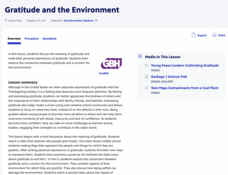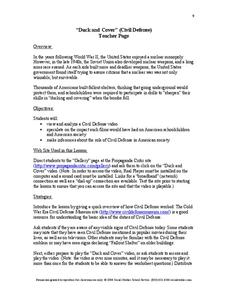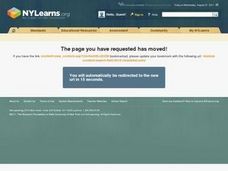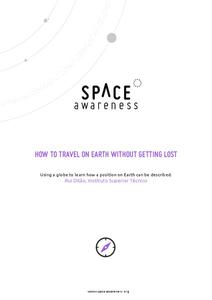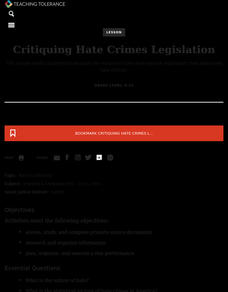Smithsonian Institution
Dia de los Muertos: Honoring our Ancestors Through Community Celebration
Oral storytelling has been an important part of every culture. The time-honored practice uses stories as a conduit for a culture's values and customs from one generation to the next. Keep the tradition going with a family interview...
Santillana USA
Celebra Kwanzaa
¡Celebramos Kwanzaa! Celebrate Kwanzaa through the fictional story Celebra Kwanzaa con Botitas y sus gatitos to delightfully explain the seven principles of Kwanzaa. Dual language learners participate in reading and vocabulary activities...
National Endowment for the Humanities
Upton Sinclair, Theodore Roosevelt, and Harvey W. Wiley
Though Upton Sinclair's novel The Jungle shocked the American public into a thorough examination of the meat-packing industry, the author was disappointed that his book's main argument—the exploitation of American immigrants—was not part...
PBS
Gratitude and the Environment
A class discussion begins a two-part lesson about gratitude and the environment. In part one, learners watch a video then share their feelings about its most memorable moment. Delving deep into the meaning of gratitude, scholars create...
Prince William Network
Migration Headache
During this game, kids become migratory shorebirds and fly among wintering, nesting, and stopover habitats. If they do not arrive at a suitable habitat on time, they do not survive. Catastrophic events are periodically introduced that...
Geophysical Institute
Latitude and Longitude with Google Earth
Travel the world from the comfort of your classroom with a instructional activity that features Google Earth. High schoolers follow a series of steps to locate places all over the earth with sets of coordinates. Additionally, they...
Social Studies School Service
“Duck and Cover” (Civil Defense)
Bert the Turtle models for viewers the 1950s Civil Defense Duck and Cover strategy that was supposed to protect citizens from a nuclear blast. After viewing the video, watchers are asked to consider the motivations of the producers of...
iCivics
Step One: We've Got Issues
What is the most pressing issue in your community? The resource helps you and your middle schoolers begin the process of doing something about it! Learners compare and contrast two pressing issues in their local counties by reading two...
iCivics
Step Six: Real World Policies
Sometimes it takes real-world examples to get concepts to click. Use the resource to instruct middle schoolers on the relevancy of public policy in today's world. Exercises include a 5W + H graphic organizer, class discussion, and...
Curated OER
Introduction to Flight: A Math, Science and Technology Integrated Project
Seventh graders review graphing procedures and practice locating points using x,y coordinates. Students calculate the areas of the top and bottom surfaces of the airfoil. They construct a test model of the airfoil.
Baylor College
Body Mass Index (BMI)
How do you calculate your Body Mass Index, and why is this information a valuable indicator of health? Class members discover not only what BMI is and practice calculating it using the height and weight of six fictitious individuals, but...
Space Awareness
How To Travel On Earth Without Getting Lost
Have you ever wanted to travel the world? Take a virtual trip with a geography lesson that uses longitude and latitude, the position of the sun, an astronomy app, and a classroom globe.
Channel Islands Film
Island Rotation: Lesson Plan 1
How do scientists provide evidence to support the theories they put forth? What clues do they put together to create these theories? After watching West of the West's documentary Island Rotation class members engage in a series of...
Candace Fleming
Ben Franklin’s Almanac: Being a True Account of the Good Gentleman’s Life
Candace Fleming's award winning Ben Franklin's Almanac is the anchor text for a classroom guide that provides teachers with a cache of pre, during, and post-reading activities.
Advocates for Human Rights
The Right to a Clean Environment in the United States
Even if a school has gone digital, chances are there's still plenty of paper being used. The three activities help scholars learn about the environmental impact of paper and another consumer products of their choosing, the issue of...
Beyond Benign
Evaluating Sustainability and Lifecycle
What makes one product greener than another? Ecology scholars analyze sustainability and lifecycle through a thought-provoking activity. Individuals pick a product, then examine its components to determine its overall impact on the world...
Carolina K-12
Political Parties and Conventions
The two major parties polarize many in America today, but it doesn't have to be that way in the classroom! Teach learners about political party platforms and modern campaigns with a mock political convention. After watching a PowerPoint...
iCivics
Governing Communities
The government at the local level acts as perhaps one of the most relevant government systems to many in their communities. Learners discover how the local government shapes their lives and the similarities and differences between the...
University of Pennsylvania
Using Political Postcards to Teach a Revolution of Political Thought
Discuss how political postcards affected everyday people's thoughts and beliefs. Pupils continue a unit on the Dreyfus Affair as they engage in class discussion, watch a video, view a PowerPoint presentation, and fill out worksheets to...
Judicial Learning Center
Do You Know Your Bill of Rights?
The Bill of Rights is much more than an important piece of paper! The rights cover everything from freedom of speech to the right to remain silent if arrested. Scholars find out their own rights by answering the questions in the form of...
Constitutional Rights Foundation
Why Don’t More People in the U.S. Vote?
To vote or not to vote, that is the question. Secondary scholars explore voter turnout in the United States. The resource uses informational text, group discussion, and a worksheet to help academics understand hindrances to voting and...
Constitutional Rights Foundation
Winner-Take-All: The Two-Party System
Two's company, three's a crowd. High school historians learn about the Electoral College, a two-party, winner-take-all voting system in the United States. The instructional activity explains the pros and cons of the two-party system,...
Encyclopedia Britannica
Meta-Study: Political Brains
Are there differences in the brains of liberals and conservatives? That is the question young political scientists are challenged to answer. Class members examine studies, consider how the results are presented, and how the studies were...
Teaching Tolerance
Critiquing Hate Crimes Legislation
The high school lesson explores what hate crimes are and how the government has responded to those crimes. Academics read legislation, analyze political cartoons, and complete hands-on-activities to understand what motivates individuals...
Other popular searches
- Social Science Role Play
- B Ed Social Science
- Unit Plan Social Science
- Social Science Lesson Plans
- Social Science Research
- Activity Social Science
- History and Social Science
- Social Science Powerpoint
- Social Science in Grade 3
- Social Science Methodology
- History Social Science
- Social Science Ducks





